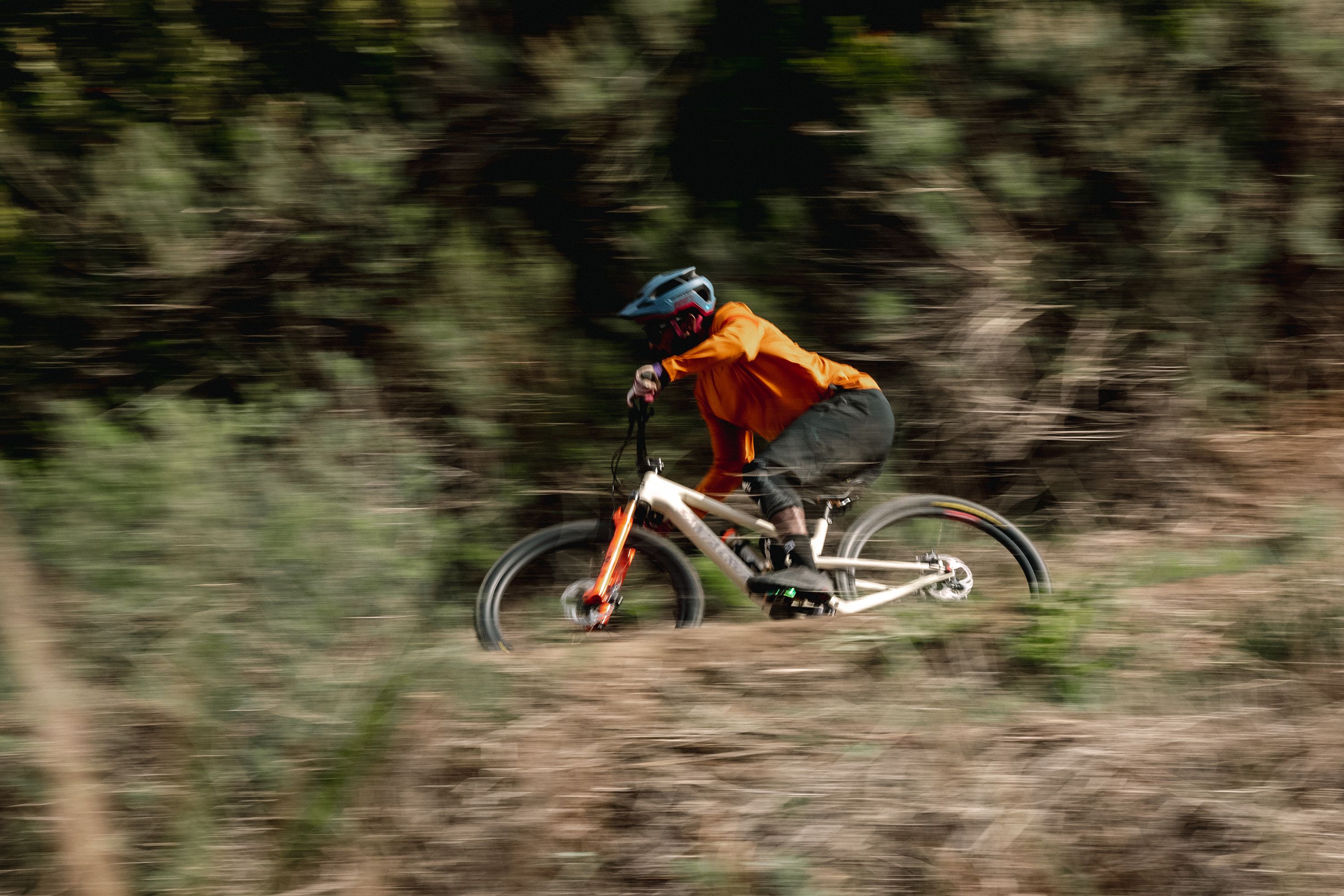Set Cycling Goals That Stick Even after the New Year Has Passed
Former DH pro Elliot Jackson knows all about setting goals, and the important ones are those you create away from the New Year hype.
At the start of the year or a riding season, the theme of setting goals always comes up. No matter how well-intentioned, these goals often never make it, at best, more than a few short months. The popular ride tracking app Strava refers to January 17 as “Quitter’s Day” because that is the average date most New Year’s Resolutions last. I mean, personally, I have already failed at eating less cookies. Why is that? What makes sticking to goals so hard and how do we overcome that?
Over the past decade, I have been on the achievement side (as a professional downhill mountain bike racer) and on the observation side (doing interviews and commentary on Red Bull TV) of goal setting. These are some of my experiences and tips I have picked up along the way that can help you next time you set out your cycling goals, be they to conquer that century on your road bike or that elusive gap jump at the local trail spot.
There are three key ingredients that you need to achieve your riding goals—be they ones you plan out at the start of the riding season, or along the way: consistency, persistence, and motivation. I’ll go through each one and give you a question to think about at the end. Let’s hop in!

Consistency
“Most people overestimate what they can do in one year and underestimate what they can do in ten years.” I love this quote by Bill Gates because it embodies what it means to be consistent. Intuitively we know we need consistency to achieve success but we don’t take into account just how much consistency we need.
I was able to live out one of my childhood dreams when I got to train with multi-time Supercross and Motocross champion Chad Reed at the end of 2016. We both had the same trainer at the time, so I went out to Florida to kick off my off-season training as he was ramping up for the Supercross season. I remember being a bit nervous because I thought it was just going to be insane and I wouldn’t be able to keep up, I thought for sure he was going to be training for 10 hours a day non-stop. I mean he’s one of the greatest of all time!
On the third day, I said to my trainer “Man, he doesn’t do anything more gnarly than we do!” He said “Of course not! It’s all about consistency. Not missing a day is way more important than being the gnarliest guy out there!” It made me realise that I was doing exactly what I needed to be doing. Showing up every single training session and doing the best I possibly could. Instead of looking for a finish line, I shifted my mindset to “This is just what I do.”
Don’t get me wrong, consistency doesn’t mean easy, there are ridiculously hard days, but it’s about doing it day in and day out, over and over and over again. That is the secret.
This may sound scary but it’s all about settling in and finding a good pace, just like when you are on some huge climb, the more you think about it, the farther away it seems to get. When you’re making a plan for how much you are going to ride, try to take this into account. Think about how sustainable your training plan is going to be over time or setting a long-term goal post and smaller achievable goals you meet along the way.
The question to answer is: Am I willing to do this over and over again even when the novelty wears off?
Persistence
If consistency is about waking up every day and putting one foot in front of the other, persistence means that most of the time you will trip and fall before you get to the front door. Author Angela Duckworth calls this having Grit.
At the end of 2020, I co-founded the Grow Cycling Foundation. Our goal was to build the first pumptrack in Los Angeles. I knew it wasn’t going to be easy because we needed to raise over a million dollars to make it a reality.
What I didn’t know was how many times I would hear the word “No”. For the next 14 months, I had meeting after meeting, sometimes for 10-12 hours a day. I refined my pitch and crafted my story. Time after time I heard “No” and in all different forms from people, companies, and governments. Some were because I messed up, others were because they didn’t have the budget, others still were because what I was saying didn’t resonate with them. The key is to understand that this is normal. There is variance inherent to any goal you are trying to achieve.
On a bike, this could be getting a flat one day or slipping a pedal on that insane Strava time. Things go wrong and when they do, the real question is how do you evaluate it?
There are many different ways to express this idea; two of which are “growth vs fixed mindset” and “outcome vs process”. In my situation, evaluating those “noes” from an outcome perspective would lead me to believe that the pumptrack is a bad idea and not valuable. Whereas if I evaluate the process I can gather feedback and understand where I can improve. Sometimes there were improvements to be made and sometimes someone may have just got up on the wrong side of the bed.
It was fascinating to see this play out in the 2021 World Cup downhill mountain bike season. There were multiple races where it started raining halfway through the day, meaning that some riders got a dry track and some riders got a wet track. In an instant, the riders had to shift their expectations and be even more diligent about evaluating their run instead of their placement. It never failed that the riders who were the most disappointed by the rain ended up having a worse race the next round in the series because they evaluated the outcome rather than the process. There was a noticeable drop in confidence due to something that was out of their control.
The next time you fail to meet an outcome, think about your process. Did you train as hard as you could? Did you stick to your plan? Did you have fun? If the answer is “Yes.” be proud of yourself, reassess where you can make improvements, and cruise on to the next challenge!
The question to answer is: What if this is 10 times harder than I think it will be?

Motivation
If we know we are going to fail, what makes us get back up? Consistency and persistence are impossible if we don’t have a reason to push for them.
To me, this is the secret sauce. It is unique to each person and it usually takes a bit of searching to find it. A moment that hugely impacted my life was when I got my first podium at the international mountain bike event, Crankworx. I was standing on the second step spraying champagne, obviously, and when I stepped off I expected my whole life to change. I thought “This is what I’ve been working toward for so long. I finally did it!” But shortly after, that sense of euphoria was nowhere to be found and I realised that “winning” wasn’t why I get out of bed in the morning.
My goal can be winning but what motivates me? What got me out of bed at 6 am to train or do those extra runs at the end of the day, was always mastering my craft. It’s pulling the thread. For me, there is nothing like it and it’s core to who I am. I can take that from riding to programming to commentating because it is what drives me.
When you are looking for a new goal, ask why you want to do it and what part of you does it satisfy. This may sound like going overboard if you just want to ride around the block but just give it a shot. This is about the times in your life that you have been the happiest when you achieved something. Was it about the connection you felt on that group ride? Was it about winning a race? Was it about working on those jumps and turns over and over again before you got them right?
The question to answer is: What well do you draw from when things get hard?
Recalibrating
Sometimes we need a little help sticking with our goals despite having thought deeply about being consistent, persistent, and motivated. Maybe you had a small goal this year of trying to ride more trails in your area and have already started to slip. You’ve ridden a few new trails and it is a goal you are passionate about, but it is so easy to just do the same loops when you are pressed for time.
In these moments, it’s important to recalibrate. Think about where you came from to give yourself perspective and take pride in the strides you have made so far in reaching those goals. Think about where you are so you can appreciate the process of progress. Think about where you are going so you can refocus on why you started this journey in the first place.
My favourite tool when I was racing to recalibrate was at the start gate about 30 minutes before my run started. The World Cups are mostly in stunning mountain villages so I would find the most beautiful spot I could and play the same 30 second segment of my favourite song. I would think about how happy I was to be sitting on my bike halfway around the world doing what I love for a living. I would tell myself to enjoy this incredible moment and make the most of it because it is only after we get done that we regret not having tried our best.
I hope this gives you some new insight on how to think about goals and how to find the ones worth achieving. Finding the answers to these questions and achieving new goals is a never-ending process. For me, finding a goal that satisfies these three ingredients has been extremely fulfilling throughout my life. Let’s make this the year you achieve all of the things you set out to do. Hopefully you stick to your commitments longer than I stuck to eating fewer cookies.
READ MORE ON: goal setting goals new year new you

